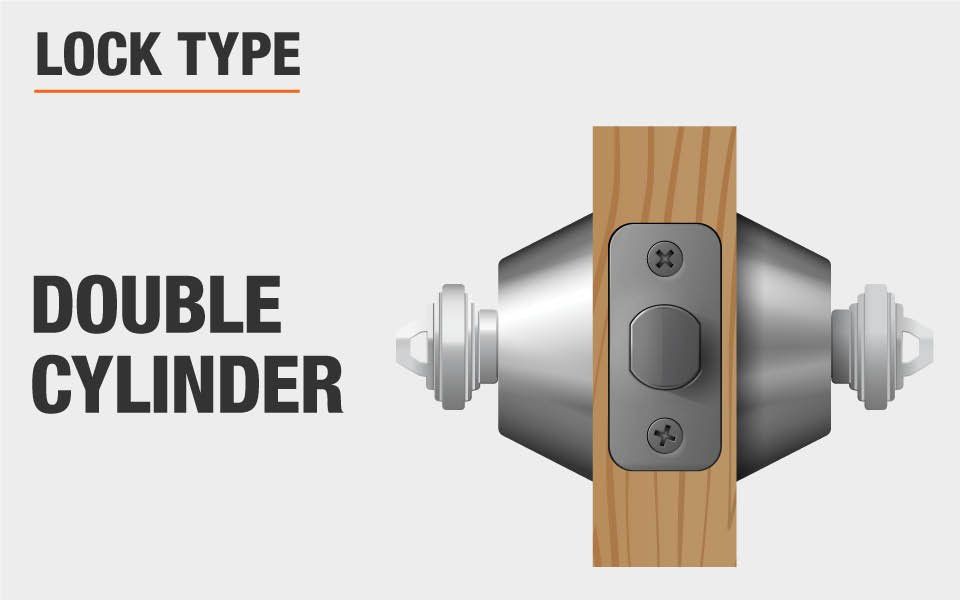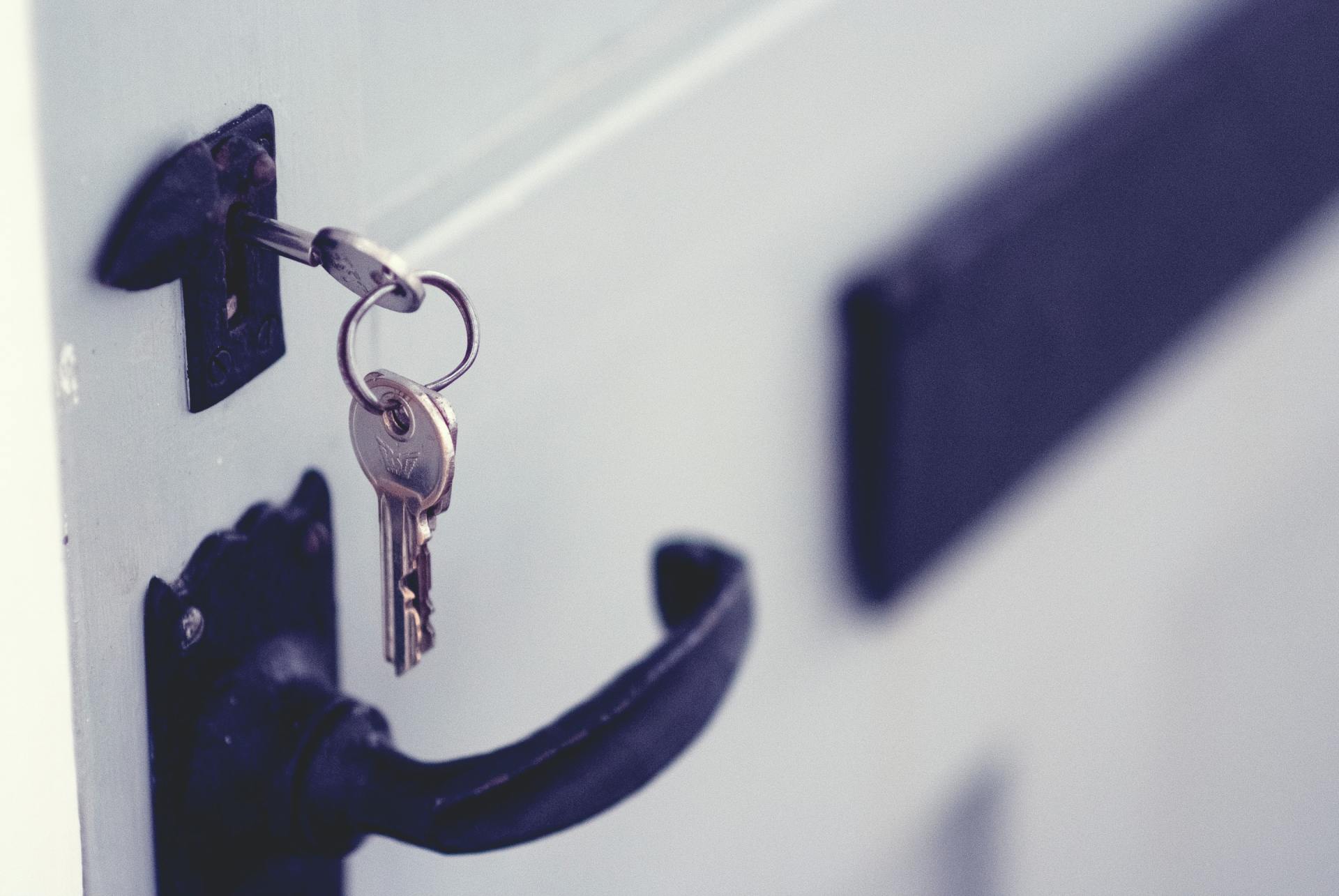Articles

Homeowners often ask us to replace their deadbolt lock with one that requires a key on the inside as well as the outside. This can have advantages, but also important disadvantages. Here’s a rundown of which situations really benefit from a double-cylinder deadbolt. First, let’s understand the terminology. A deadbolt is a lock that, once fully engaged, cannot be “shimmed” or “jimmied” open. The bolt will retract only by operating the thumb-turn or key. A single-cylinder deadbolt is the most common type. It requires a key to operate the lock from the outside, but has a thumb-turn on the inside. A double-cylinder lock requires a key to operate the door from either side. Now, under what circumstances is a double-cylinder lock helpful? In short, it is helpful only if an easily broken pane of glass would allow access to the thumb-turn of the lock, but not passage into the house. Also, you must have an emergency escape plan! A person who is panicked or overcome by smoke cannot operate a key. People die behind locked doors. Your life is more important than your “valuables.” Situation 1: No glass in or near the door. There is simply no reason to use a double-cylinder lock. Situation 2: Full-glass or half-glass door. There is still no reason to use a double-cylinder lock. If an intruder breaks the glass, they don’t need to unlock or open the door. The opening from the broken glass is big enough for them to enter anyway. Take heart though: modern, tempered, double-glazed windows are pretty difficult to break, and it will make quite a noise! Therefore, a double-cylinder lock provides no additional security, but does cause inconvenience and a safety hazard for you and your family. Situation 3: A small glass pane or sidelight. A double-cylinder lock might improve security. In this case, a burglar might break the small pane of glass, especially if it is old, single-pane glass. A double-cylinder lock might deter him, since he still needs to open the door to get inside. However, fire safety must be part of your planning. Firefighters and life safety experts all know that when a fire or other emergency creates panic, people simply cannot find or operate keys. If you have alternate routes of escape, then a double-cylinder may be appropriate for this door. If you don’t have a different plan, stick with a single-cylinder lock, and consider a more secure door design. A new door would provide better security and energy savings, too! This advice comes to you from someone who does not sell doors!

You're all excited. Finally, you've decided to pay a security professional to rekey your facility with a master key system. Each person will carry only one key (maybe two) to go everywhere in the facility they're supposed to go -- and nowhere else. Gone will be the heavy jumble of keys. No more time will be wasted flipping through dozens of keys to open each door. Gone will be the daily hassle of users unable to access a room when they need to. Gone will be the thefts and that nagging feeling that you don't know who has access to your facility. Now, how can you make it last? If you are careless, you'll rack up more rekeying costs, suffer more security breaches, and soon have a big, messy ring of keys again. It's up to you to take care to avoid this. The locksmith can design and implement a marvelous master key system, but only you can make it last. Here's how: 1. Be careful of duplicate keys. The most common way that keys fall into the wrong hands is through unauthorized duplication. If your master key system uses a key that is widely available, you cannot assume that people are not copying and sharing the keys they've been issued. Stamping "do not duplicate" on a widely available key is not effective in preventing duplicate keys. The only way to prevent unauthorized duplication of your keys is to install key cylinders that use patented or restricted keys. For most restricted key systems, duplicate keys are only available from the locksmith who supplied the cylinders. They release keys only to the authorized administrators of the facility. Usually, they'll keep a signature card on file for this purpose. Also, restricted keys are usually serial numbered so that your administrators can track who carries which key and hold them accountable for returning their key at a later date. Restricted keys prevent keys from spreading due to authorized duplication; however, they do not prevent you and your staff from making poor judgments about issuing the keys. 2. Keep your keys close to your chest. The single most important thing you can do to keep your facility secure and keep your master key system humming along is to carefully control the distribution of keys. The higher up the chart a key is (the more doors it opens), the more important this is. If you give one master key to the wrong person, you may need to rekey the entire facility again! Therefore, you must think very carefully about the keys you issue. Keep careful records regarding which keys work which doors (your security professional should provide these records along with the new keys). Then, put strict policies in place to ensure that the right keys are issued to the right people. The locksmith can only issue the keys to their contact person. The locksmith cannot decide who gets the keys from there. Exercising good judgment about distributing keys is entirely up to you. 3. Coordinate all rekeying through the locksmith who designed your system (and therefore holds the records). All keys issued for your facility need to be coordinated with the master key and the other keys issued. There should be no keys issued or locks changed in your facility without reference to the master key records. This is a document that specifies all the keys that are safe to use with your master key, which are already in use, and the hierarchy of the keys.. If another locksmith is just given a master key and asked to make up a key to go with it, that key might operate doors you don't intend, or other keys from your facility might work the newly rekeyed lock(s). You might not realize this until you find that you're having security breaches. When the professional locksmith services your locks by referring to the master key chart, you can be sure that the keys you want to work, will; the keys you don't want to work, won't. If your building has tenants, this means that you must require them to either coordinate rekeying through you, or at least require them to use your locksmith. It is best to specify this in your lease agreements. By following these three simple rules, you can keep your master key system humming along smoothly for many years!
So your house is 40-100 years old or more, and the exterior door still has the original lock with a “pitcher handle.” The keyhole is above the handle and operates both the latch and the deadbolt. Or rather, it did until it broke down. In some cases the lock can be repaired. However, at a certain point it’s finally time to replace the lock. Exact replacements are not available for old locks such as this, so there will be some modifications to the door no matter what. There are three options that you have: 1. New Door. If your door is cracked, sagging or just plain ugly, now is the time to replace it. Don’t spend money on hardware for a door that is unsuitable. 2. Modernize. Adapt the door to accept modern (cylindrical) lock hardware. This option is less expensive than the other options, but any historic appeal the door had is sacrificed. Still, this is a popular option for budget-conscious homeowners and landlords. 3. New Mortise Retrofit. Replace the old mortise lock with a new one. Locks that are identical in every dimension to the old lock are not available. The new lock will surely need some new holes cut through the door. Conversely, it will need to cover some leftover holes. Choose a lock with a long backplate to cover most of these blemishes. There may still be one hole (where the old handle attached at the bottom) that needs to be patched and painted. This option is more expensive than modernizing, but it enhances the historic appeal of the door while providing the ease and reliability of a brand new lock. Emtek offers mortise locks in every conceivable style and color.
